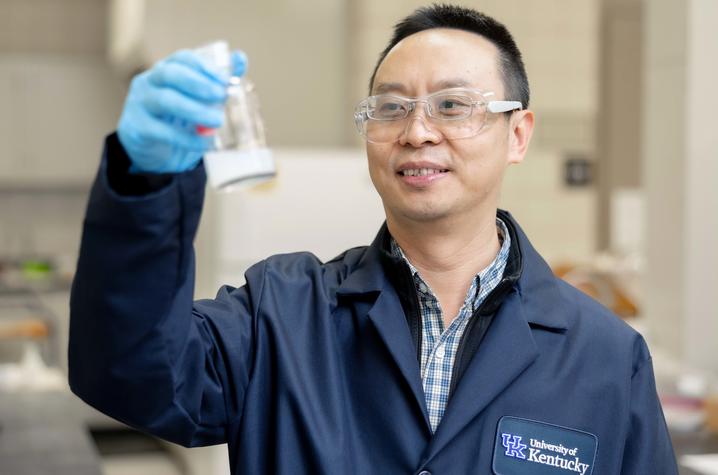UK researchers lead a national team, transforming solid waste into aviation fuel

LEXINGTON, Ky. (April 25, 2024) — In a move towards sustainable energy and waste management, the University of Kentucky has launched a pioneering research initiative that seeks to turn everyday trash into high-quality sustainable aviation fuels (SAF).
Titled "Surface Enhanced Smart Preprocessing of Municipal Solid Wastes for Year-Round Supply of Conversion-Ready Feedstocks," the study aims to address excessive landfill waste. Led by Jian Shi, associate professor in the Martin-Gatton College of Agriculture, Food and Environment Department of Biosystems and Agricultural Engineering (BAE), this project has been awarded $2.12 million in federal funding from the Department of Energy (DOE).
The United States currently faces a critical challenge with over 50% of municipal solid waste (MSW) ending up in landfills, leading to increased greenhouse gas emissions and resource loss. This project seeks to address these issues head-on by developing innovative technologies to enhance the surface properties and uniformity of MSW feedstocks — facilitating their efficient conversion into biofuels and bioproducts.
"We are embarking on a journey to divert landfilled waste for bioenergy production,” Shi said. “Our goal is to transform municipal solid waste from an environmental burden into a valuable resource, paving the way for sustainable, clean energy solutions."
The project is a collaborative effort involving a multi-institutional team, including researchers from Iowa State University, Idaho National Laboratory, Red Rock Biofuels and Wasatch Integrated Waste Management.
Spanning 36 months, the initiative aims to:
- Develop novel blending and densification strategies to improve the stability and convertibility of waste plastics with biomass feedstocks.
- Implement mechanical separation methods to remove inorganic contaminants from MSW.
- Create a rapid, nondestructive 3D imaging technology for comprehensively characterizing MSW fractions.
- Use deep learning-based predictive models to guide preprocessing strategies and optimize feedstock quality.
“The team wants to try and leverage advanced 3D imaging and hyperspectral technologies to identify and categorize waste materials,” Shi said. “This technological approach allows for the efficient sorting of waste components suitable for biofuel conversion, a critical step managed through machine learning algorithms. These algorithms, akin to those used by tech giants for image recognition, play a crucial role in determining waste composition and optimizing the sorting process.”
Upon completion, the project is expected to deliver a novel preprocessing strategy tailored for converting non-recycled MSW into high-quality, conversion-ready feedstock for SAF biorefineries. This will mark a significant milestone in advancing biofuels and bioproducts research, promoting sustainable MSW-based bioeconomy and addressing the technical risks associated with the thermochemical conversion of MSW to SAF.
By turning trash into valuable jet fuel, Shi and his team are not just addressing environmental issues but are also paving the way for a sustainable industrial model that other sectors might emulate.
"We’re aiming to close the loop between waste generation and energy production,” said Mike Montross, BAE professor and co-principal investigator of the project. “We want not only to reduce landfill use and greenhouse gas emissions but also to enhance energy security by developing domestic, renewable energy sources."
This material is based upon work supported by the Department of Energy under Award Number DE-EE0010295. This report was prepared as an account of work sponsored by an agency of the United States Government. The views and opinions of authors expressed herein do not necessarily state or reflect those of the United States Government or any agency thereof.
As the state’s flagship, land-grant institution, the University of Kentucky exists to advance the Commonwealth. We do that by preparing the next generation of leaders — placing students at the heart of everything we do — and transforming the lives of Kentuckians through education, research and creative work, service and health care. We pride ourselves on being a catalyst for breakthroughs and a force for healing, a place where ingenuity unfolds. It's all made possible by our people — visionaries, disruptors and pioneers — who make up 200 academic programs, a $476.5 million research and development enterprise and a world-class medical center, all on one campus.




